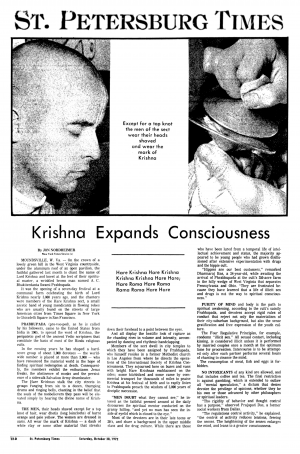Krishna Expands Consciousness
This article, "Krishna Expands Consciousness" was published in the St. Petersburg Times, October 28, 1972, in St. Petersburg, Florida.
By JON NORDHEIMER
New York Times Service (c)
MOUNDSVILLE, W. Va. - On the crown of a lovely green hill in the West Virginia countryside, under the aluminum roof of an open pavilion, the faithful gathered last month to chant the name of Lord Krishna and kneel at the feet of their spiritual master, a wrinkled brown man named A. C. Bhaktivedanta Swami Prabhupada.
It was the opening of a seven-day festival at a communal farm celebrating the birth of Lord Krishna nearly 5,000 years ago, and the chanters were members of the Hare Krishna sect, a small ascetic band of young mendicants in flowing robes who are usually found on the streets of large American cities from Times Square in New York to Ghiradelli Square in San Francisco.
PRABHUPADA (pro-voo-pod), as he is called by his followers, came to the United States from India in 1965, to spread the word of Krishna, the peripatetic god of the ancient Vedic scriptures that constitute the basis of most of the Hindu religious cults.
In the ensuing years he has shaped a hard-score group of about 1,000 devotees - the world-wide number is placed at more than 3,000 - who have renounced the material world in the hope of finding spiritual redemption at death. Consequently, the members exhibit the enthusiasm Jesus freaks, the abstinence of monks and the persistence of a sidewalk Salvation Army drumbeater.
The Hare Krishnas stalk the city streets in groups ranging from six to a dozen, thumping drums and ringing bells, chanting in the belief that the souls of the nonbelievers they pass will be elevated simply by hearing the divine name of Krishna.
THE MEN, their heads shaved except for a top knot of hair, wear dhotis (long loincloths) of burnt orange and pale yellow. The women are dressed in saris. All wear the mark of Krishna - a daub of white clay or some other material that streaks down their forehead to a point between the eyes.
And all display the beatific look of rapture as the chanting rises in volume and intensity, accompanied by dancing and rhythmic handclapping.
*************
Hare Krishna Hare Krishna Krishna Krishna Hare Hare;
Hare Rama Hare Rama Rama Rama Hare Hare
*************
Members of the sect dwell in city temples to which they have been assigned by Prabhupada, who himself resides in a former Methodist church in Los Angeles from where he directs the operations of the International Society of Krishna Consciousness. They sojourned here on buses and vans with bright Hare Krishnas emblazoned on the sides; some hitchhiked and some came by commercial transport for thousands of miles to praise Krishna at his festival of birth and to raptly listen to Prabhupada preach the wisdom of 5,000 years of disciplic succession.
"MEN DOUBT what they cannot see," he intoned as the faithful pressed around at the daily discourses the spiritual mentor conducted on the grassy hilltop, "and yet no man has seen the inside of eyelid which is closed to the eye."
Most of the devotees are in their late teens or 20's, and share a background in the upper middle class and the drug culture. While there are those who have been lured from a temporal life of intellectual achievement and status, the majority appeared to be young people who had grown disillusioned after extensive experimentation with drugs and the hippie cult.
"Hippies are our best customers," remarked Dharmaraj Das, a 24-year-old, while awaiting the arrival of Prabhupada at the cult's 350-acre farm in the hilly wedge of West Virginia that separates Pennsylvania and Ohio. "They are frustrated because they have learned that a life of illicit sex and drugs is not the way to spiritual consciousness."
PURITY OF MIND and body is the path to spiritual awakening, according to the cult's saintly Prabhupada, and devotees accept rigid rules of conduct that reject not only the materialism of their city-suburban background, but also the sense gratification and free expression of the youth culture.
The Four Regulative Principles, for example, condemn "illicit sex." All sexual contact, including kissing, is considered illicit unless it is performed by married couples once a month at the optimum time for procreation. Intercourse is to be attempted only after each partner performs several hours of chanting to cleanse the mind.
The consumption of meat, fish and eggs is forbidden.
NO INTOXICANTS of any kind are allowed, and that includes coffee and tea. The final restriction is against gambling, which is extended to outlaw all "mental speculation," a dictum that denies devotee the privilege of opinions, whether they be his own or those advanced by other philosophers or spiritual leaders.
"The rigidity of behavior and thought control has a purpose," observed Prajapati Das, a former social workers from Dallas.
"The regulations control activity," he explained. "the control of activity reduces tensions, freeing the senses. The heightening of the senses enlarges the mind, and leans to a greater consciousness."
